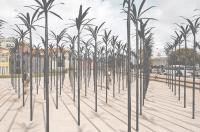 It is important that a public work (especially a memorial) does not show just one face, but that it opens up to different readings. It is a plantation in mourning, burned, which reflects the lugubrious and funerary side of the plantation. And it also pays tribute to the resistance of the enslaved by the gesture of burning the plantation and boycotting the regime of oppression. The plantation is where the process of dehumanization occurs.
It is important that a public work (especially a memorial) does not show just one face, but that it opens up to different readings. It is a plantation in mourning, burned, which reflects the lugubrious and funerary side of the plantation. And it also pays tribute to the resistance of the enslaved by the gesture of burning the plantation and boycotting the regime of oppression. The plantation is where the process of dehumanization occurs.
Face to face
19.06.2024 | by Marta Lança
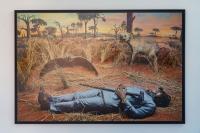 The river remembers the arrival of extractivism. One day many years ago, she feels the wake of huge ships against her current and became uneasy. Over time, she comes to share shivers with felled forests, to balk at the blanched palette of monocrop agriculture, to recoil at the sharp poisonous taste of chemical waste, and to deeply mourn the disappearance of her people: people sold into slavery, killed by disease, worked to death in mines, and severed from her nurturing flows by the breaking of their cultures. Oh, what she has seen. Oh, what she has endured.
The river remembers the arrival of extractivism. One day many years ago, she feels the wake of huge ships against her current and became uneasy. Over time, she comes to share shivers with felled forests, to balk at the blanched palette of monocrop agriculture, to recoil at the sharp poisonous taste of chemical waste, and to deeply mourn the disappearance of her people: people sold into slavery, killed by disease, worked to death in mines, and severed from her nurturing flows by the breaking of their cultures. Oh, what she has seen. Oh, what she has endured.
Mukanda
24.12.2023 | by Imani Jacqueline Brown
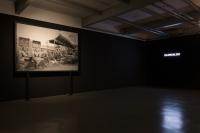 “The Mechanics of the Ephemeral” stems from the idea that art as a mechanism allows us to travel to different temporal spaces by adopting an approach that often resorts to fantasy, but in which the imagination becomes an important ally in historical and socio-political questioning. Although the discourses of the invited artists vary in their approaches and navigation of this temporal and identity- forming flow, the common denominator is their relationship with a continent inhabited by the dreams and follies of foreign ghosts. There is also an urgent need to address a future still based on meaningless promises of progress and freedom – a situation which is not exclusive to the African continent – to equally embrace the influences of the various artistic languages and references that comprise this joint work and overflow national borders and continental platforms.
“The Mechanics of the Ephemeral” stems from the idea that art as a mechanism allows us to travel to different temporal spaces by adopting an approach that often resorts to fantasy, but in which the imagination becomes an important ally in historical and socio-political questioning. Although the discourses of the invited artists vary in their approaches and navigation of this temporal and identity- forming flow, the common denominator is their relationship with a continent inhabited by the dreams and follies of foreign ghosts. There is also an urgent need to address a future still based on meaningless promises of progress and freedom – a situation which is not exclusive to the African continent – to equally embrace the influences of the various artistic languages and references that comprise this joint work and overflow national borders and continental platforms.
I'll visit
21.12.2021 | by Gisela Casimiro
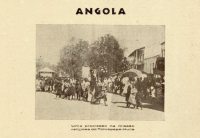 References to Portugal’s epic, seafaring past like these litter this city – there is even a Vasco da Gama shopping mall. But until now, there has never been a single explicit reference, memorial or monument in Portugal’s public space to its pioneering role in the transatlantic slave trade, nor any acknowledgement of the millions of lives that were stolen between the 15th and 19th centuries.
References to Portugal’s epic, seafaring past like these litter this city – there is even a Vasco da Gama shopping mall. But until now, there has never been a single explicit reference, memorial or monument in Portugal’s public space to its pioneering role in the transatlantic slave trade, nor any acknowledgement of the millions of lives that were stolen between the 15th and 19th centuries.
Games Without Borders
15.03.2021 | by Ana Naomi de Sousa
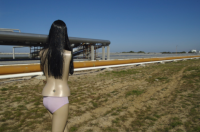 Interview carried out by online chat, at various times and on various days, punctuated by continual breaks in the Internet connection that maps out the transatlantic and ex-colonial triangulation between Luanda, Angola – Kiluanji Kia Henda’s home, a city that I have never visited; São Paulo, Brazil – my temporary home and the place where I first met Kiluanji, a place that is close to the origin of the series presented here; Lisbon, Portugal – my permanent home, source of the schedule drawn up by my computer and Kiluanji’s ex-temporary home.
Interview carried out by online chat, at various times and on various days, punctuated by continual breaks in the Internet connection that maps out the transatlantic and ex-colonial triangulation between Luanda, Angola – Kiluanji Kia Henda’s home, a city that I have never visited; São Paulo, Brazil – my temporary home and the place where I first met Kiluanji, a place that is close to the origin of the series presented here; Lisbon, Portugal – my permanent home, source of the schedule drawn up by my computer and Kiluanji’s ex-temporary home.
Face to face
08.04.2011 | by Lígia Afonso
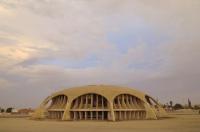 Kiluanji Kia Henda has displayed his art internationally – from Guangzhou to Cape Town, from Nairobi to Venice – which decouples his work from the exclusive legitimacy granted by Western contemporary art capitals. Another unique trait of his trajectory is that so far, his work has not been presented and sanctioned by the “small” world of its former “metropole”, Lisbon. As an Angolan artist, and therefore, from an independent country today and once a Portuguese colony, his art world’s has been extraneous to a set of cultural policies that take Portuguese-as-connection, and which rely on a closed circuit showcasing of art and its artists, traveling between ex-colonies and the ex-metropole.
Kiluanji Kia Henda has displayed his art internationally – from Guangzhou to Cape Town, from Nairobi to Venice – which decouples his work from the exclusive legitimacy granted by Western contemporary art capitals. Another unique trait of his trajectory is that so far, his work has not been presented and sanctioned by the “small” world of its former “metropole”, Lisbon. As an Angolan artist, and therefore, from an independent country today and once a Portuguese colony, his art world’s has been extraneous to a set of cultural policies that take Portuguese-as-connection, and which rely on a closed circuit showcasing of art and its artists, traveling between ex-colonies and the ex-metropole.
Face to face
12.04.2010 | by Marta Mestre
 It is important that a public work (especially a memorial) does not show just one face, but that it opens up to different readings. It is a plantation in mourning, burned, which reflects the lugubrious and funerary side of the plantation. And it also pays tribute to the resistance of the enslaved by the gesture of burning the plantation and boycotting the regime of oppression. The plantation is where the process of dehumanization occurs.
It is important that a public work (especially a memorial) does not show just one face, but that it opens up to different readings. It is a plantation in mourning, burned, which reflects the lugubrious and funerary side of the plantation. And it also pays tribute to the resistance of the enslaved by the gesture of burning the plantation and boycotting the regime of oppression. The plantation is where the process of dehumanization occurs.  The river remembers the arrival of extractivism. One day many years ago, she feels the wake of huge ships against her current and became uneasy. Over time, she comes to share shivers with felled forests, to balk at the blanched palette of monocrop agriculture, to recoil at the sharp poisonous taste of chemical waste, and to deeply mourn the disappearance of her people: people sold into slavery, killed by disease, worked to death in mines, and severed from her nurturing flows by the breaking of their cultures. Oh, what she has seen. Oh, what she has endured.
The river remembers the arrival of extractivism. One day many years ago, she feels the wake of huge ships against her current and became uneasy. Over time, she comes to share shivers with felled forests, to balk at the blanched palette of monocrop agriculture, to recoil at the sharp poisonous taste of chemical waste, and to deeply mourn the disappearance of her people: people sold into slavery, killed by disease, worked to death in mines, and severed from her nurturing flows by the breaking of their cultures. Oh, what she has seen. Oh, what she has endured.  “The Mechanics of the Ephemeral” stems from the idea that art as a mechanism allows us to travel to different temporal spaces by adopting an approach that often resorts to fantasy, but in which the imagination becomes an important ally in historical and socio-political questioning. Although the discourses of the invited artists vary in their approaches and navigation of this temporal and identity- forming flow, the common denominator is their relationship with a continent inhabited by the dreams and follies of foreign ghosts. There is also an urgent need to address a future still based on meaningless promises of progress and freedom – a situation which is not exclusive to the African continent – to equally embrace the influences of the various artistic languages and references that comprise this joint work and overflow national borders and continental platforms.
“The Mechanics of the Ephemeral” stems from the idea that art as a mechanism allows us to travel to different temporal spaces by adopting an approach that often resorts to fantasy, but in which the imagination becomes an important ally in historical and socio-political questioning. Although the discourses of the invited artists vary in their approaches and navigation of this temporal and identity- forming flow, the common denominator is their relationship with a continent inhabited by the dreams and follies of foreign ghosts. There is also an urgent need to address a future still based on meaningless promises of progress and freedom – a situation which is not exclusive to the African continent – to equally embrace the influences of the various artistic languages and references that comprise this joint work and overflow national borders and continental platforms.  References to Portugal’s epic, seafaring past like these litter this city – there is even a Vasco da Gama shopping mall. But until now, there has never been a single explicit reference, memorial or monument in Portugal’s public space to its pioneering role in the transatlantic slave trade, nor any acknowledgement of the millions of lives that were stolen between the 15th and 19th centuries.
References to Portugal’s epic, seafaring past like these litter this city – there is even a Vasco da Gama shopping mall. But until now, there has never been a single explicit reference, memorial or monument in Portugal’s public space to its pioneering role in the transatlantic slave trade, nor any acknowledgement of the millions of lives that were stolen between the 15th and 19th centuries.  Interview carried out by online chat, at various times and on various days, punctuated by continual breaks in the Internet connection that maps out the transatlantic and ex-colonial triangulation between Luanda, Angola – Kiluanji Kia Henda’s home, a city that I have never visited; São Paulo, Brazil – my temporary home and the place where I first met Kiluanji, a place that is close to the origin of the series presented here; Lisbon, Portugal – my permanent home, source of the schedule drawn up by my computer and Kiluanji’s ex-temporary home.
Interview carried out by online chat, at various times and on various days, punctuated by continual breaks in the Internet connection that maps out the transatlantic and ex-colonial triangulation between Luanda, Angola – Kiluanji Kia Henda’s home, a city that I have never visited; São Paulo, Brazil – my temporary home and the place where I first met Kiluanji, a place that is close to the origin of the series presented here; Lisbon, Portugal – my permanent home, source of the schedule drawn up by my computer and Kiluanji’s ex-temporary home.  Kiluanji Kia Henda has displayed his art internationally – from Guangzhou to Cape Town, from Nairobi to Venice – which decouples his work from the exclusive legitimacy granted by Western contemporary art capitals. Another unique trait of his trajectory is that so far, his work has not been presented and sanctioned by the “small” world of its former “metropole”, Lisbon. As an Angolan artist, and therefore, from an independent country today and once a Portuguese colony, his art world’s has been extraneous to a set of cultural policies that take Portuguese-as-connection, and which rely on a closed circuit showcasing of art and its artists, traveling between ex-colonies and the ex-metropole.
Kiluanji Kia Henda has displayed his art internationally – from Guangzhou to Cape Town, from Nairobi to Venice – which decouples his work from the exclusive legitimacy granted by Western contemporary art capitals. Another unique trait of his trajectory is that so far, his work has not been presented and sanctioned by the “small” world of its former “metropole”, Lisbon. As an Angolan artist, and therefore, from an independent country today and once a Portuguese colony, his art world’s has been extraneous to a set of cultural policies that take Portuguese-as-connection, and which rely on a closed circuit showcasing of art and its artists, traveling between ex-colonies and the ex-metropole. 